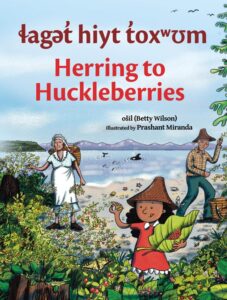Book Review: ɬagət̓ hiyt t̓oxʷʊm – Herring to Huckleberries
 Reviewed by Alex Hebert
Reviewed by Alex Hebert
It isn’t often that I can’t find the correct font to use for a book review! In this case, I am not sure what the font is for ʔayʔajuθəm (the Tla’amin Language) that ɬagət̓ hiyt t̓oxʷʊm – Herring for Huckleberries is written in!
Written by ošil (Betty Wilson) and illustrated by Prashant Miranda, this book is definitely a good resource for all ages to help the revitalizing of ʔayʔajuθəm. The author has dedicated the last 30 years to the archiving and preservation of the language of the people of the ɬaʔəmɩn Nation – one of the Coastal Salish Tribes on the Sunshine Coast of B.C. A lot of the language was lost when children were sent to Indian Residential Schools. The author points out that there are many education resources in English and French, but not enough in the Indigenous languages to help students learn and to preserve the language.
The book is about harvesting seasons in the ɬaʔəmɩn Nation. And not just about the herring or huckleberries, it’s about family, community and how everyone has a role to play in the spring harvest.
The main character, ošil, is a little girl who absorbs the Traditional Ecological Knowledge from her grandparents. The book includes a list of all the traditional foods of the ɬaʔəmɩn Nation. It is interesting how through storytelling, she describes how everything is prepared, thus transferring some of that traditional knowledge to the reader. It also includes a glossary of words in ʔayʔajuθəm. Even though the book has both ʔayʔajuθəm and English, ʔayʔajuθəm is peppered throughout the English and readers are encouraged to figure out what those words mean. It also includes a page of pronunciation tips.
The illustrations are fantastic, and the characters are similar to the style of The Water Walker.
This book also has a separate teachers guide by Jerica Fraser and published by Portage and Main Press with some curriculum activities for students to do before, during, and after reading. It includes prompts for discussion. Teachers will be able to guide their students through the rich landscape of food sovereignty and Traditional Ecological Knowledge. Students will also get an understanding of the vital role that First Nation food systems play in protecting the environment, fostering sustainable communities, and nurture a shared sense of responsibility.
The author says that Traditional Ecological Knowledge is more than just a way of knowing. It is a critical part of preserving ecosystems, languages, and cultures.
Authored by ošil (Betty Wilson) and illustrated by Prashant Miranda, ɬagət̓ hiyt t̓oxʷʊm – Herring to Huckleberries. Winnipeg: HighWater Press, 2025.
ISBN 918-1774921180


